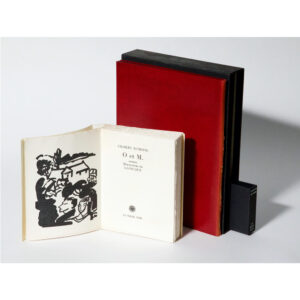Lapicque, Charles
Charles Lapicque, French engineer, theorist and painter, occupies a singular place in the history of modern art. Born on October 6, 1898 in Theizé, France, he began his scientific training by graduating from the École Centrale engineering school. Fascinated by mathematics and optics, he devoted himself to the study of visual perception and color, which had a profound influence on his artistic approach. Read more
Here is the only result
Charles Lapicque (1898-1988)
Lapicque began painting in earnest in the 1920s, but it was only after the Second World War that he established himself as a major figure in the French pictorial revival. His work is characterized by constant research into the relationship between color and space, and by a chromatic boldness that is as disconcerting as it is fascinating. He favors vivid tones, line play and deconstructed forms, while maintaining a rigorous structure inherited from his scientific training.
In 1946, he took part in the landmark exhibition "Peintures de la tradition française" organized by Jean Bazaine, thus affirming his membership of thelyrical abstraction movement. However, Lapicque never let himself be confined to a single stylistic label. His works oscillate between abstraction and figuration, exploring such varied themes as the sea, Breton landscapes, mythology and historical scenes.
His work is marked by an exceptional freedom of expression, where contours dissolve in favor of a colorful vibration that brings his canvases to life. Lapicque also explores the temporal dimension in his paintings, creating complex visual spaces where traditional perspective is deliberately disrupted.
Over the course of his career, he received numerous awards, including the Grand Prix National des Arts in 1979, in recognition of his major contribution to French contemporary art.
Today, Charles Lapicque's works are held in prestigious public and private collections, including those of the Musée National d'Art Moderne - Centre Pompidou and the Musée des Beaux-Arts de Rennes.
Charles Lapicque remains an essential figure in understanding the challenges of French pictorial modernity, combining scientific rigor and creative freedom with rare mastery.

